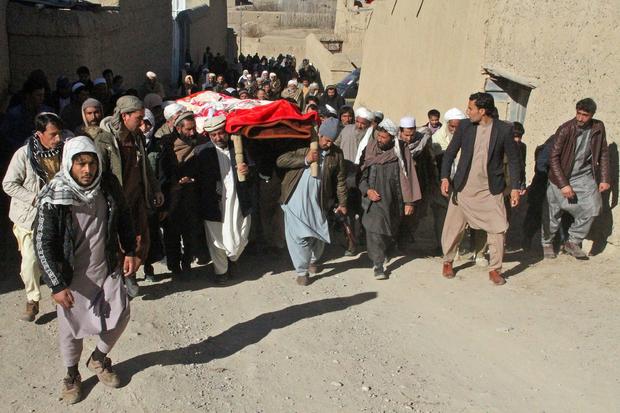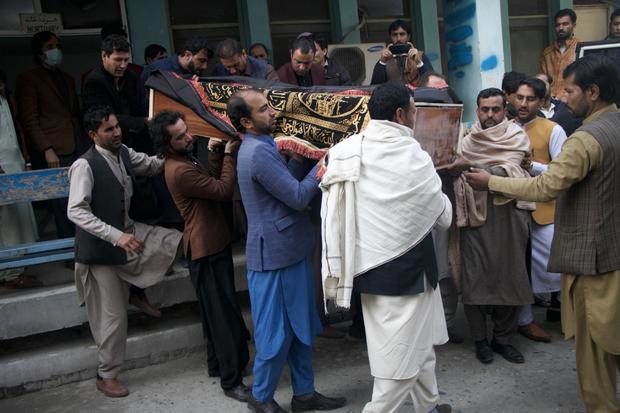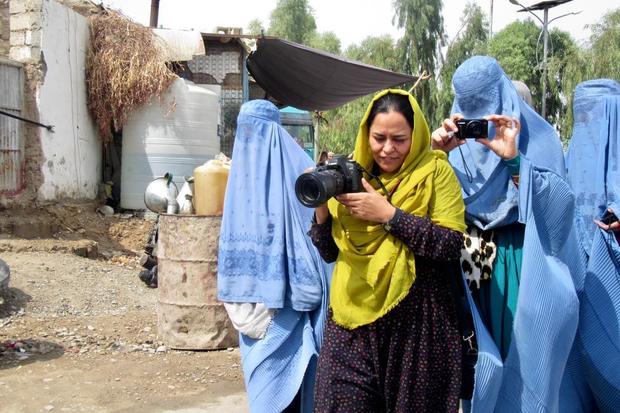Nazifa Mahbobi worked for years as a journalist in Afghanistan's capital, most recently for Radio Free Europe. Last month, she fled her country after repeated warnings from the national intelligence agency that insurgents were plotting to kill her.
She only made the difficult decision to leave after a would-be assassin, disguised as vaccination worker, made it into her home.
"The angel of death made it to my apartment doorsteps," Mahbobi told CBS News. "I thought I was dying gradually from the inside when the threats turned out to be serious."
Afghan officials have confirmed to CBS News that a terror cell was established jointly by the Taliban and the ISIS branch in the country and tasked with disguising themselves as social workers, including vaccine administrators, to assassinate journalists in Kabul.
Mahbobi said women knocked on the door of her home twice, but she wasn't there on either occasion. The women spoke to her mother, who had no idea the visitors had come to kill her daughter.
Mahbobi is the sole breadwinner in her family. She's still dedicated to her career as a journalist, but now she's in hiding, fearing for her life amid an unprecedented wave of violence against media workers in Afghanistan that has prompted many to flee.
Deadly work
The growth of a thriving, independent media has been one of the greatest success stories in Afghanistan since the 2001 U.S.-led invasion to topple the Taliban regime. Journalists have worked to hold the government accountable for its shortcomings, and the Taliban for its atrocities.
But it has come at a price. Journalists have faced constant threats, intimidation, and violence from state and non-state actors. Many Afghan journalists have been threatened or intimidated for their work by government security agencies and civilian officials. Some have been attacked and beaten.
Mujib Khalwatgar is the director of Nai, a media watchdog and advocacy organization that promotes free speech in Afghanistan. He told CBS News that security and financial threats forced at least 10 Afghan radio stations to close in 2020. Almost a dozen journalists were killed last year, six of them in the last three months alone.
"We have recorded at least 11 cases of murder, 20 cases of injuries, 10 cases of kidnapping and over 30 cases of beatings in 2020," Khalwatgar told CBS News.
"I want to stay alive"
Mariam Alimi, a photojournalist who also teaches her trade, has covered the news in Afghanistan since 2006. Now, she rarely leaves her home, and she's trying to seek asylum in a Western country.
Alimi's first battle was against her own culture, and even members of her own family: She often traveled to different provinces for her work without a male relative, which is considered taboo in the conservative community in which she was raised.
She was able to overcome those hurdles, proving the value of her work. But she's feels unable to fight a terrorist ideology that places no value on capturing the truth about what's going on in Afghanistan through a camera lens. The extremists consider her work a violation of Islamic values.
"I want to leave Afghanistan because I want to stay alive and support my family," Alimi told CBS News. "If something happens to me, my whole family will fall apart and lose everything."
Leverage by threat
Journalists, government officials and the U.S. military say the ongoing peace talks between the Afghan government and the Taliban have coincided with an escalation in Taliban threats against journalists.
"It is definitely the Taliban behind this terror and these threats," Mahbobi told CBS News, referring to the visits paid to her Kabul home. "In the past few months, I was covering the peace negotiations and I was talking regularly with the Taliban spokesmen, and they have identified me."
The U.S.-brokered negotiations between the government and the insurgents began in September and are still underway in Doha, Qatar. There have been no substantive achievements thus far.
Tariq Arain, a spokesman for the Afghan Ministry of Interior, told CBS News that confessions by detainees and other intelligence prove the Taliban are directly involved in attacking soft targets, including the assassination of journalists.
"They want to pressure the government through such targeted killings," Arain said.
In a January 4 tweet, U.S. military spokesman Colonel Sonny Leggett blamed the Taliban directly for recent targeted killings, saying: "The Taliban's campaign of unclaimed attacks & targeted killings of government officials, civil society leaders & journalists must also cease for peace to succeed."
A leading analyst in Kabul who has studied the Taliban insurgency for years agrees with the U.S. and Afghan government's allegations.
"For the Taliban, some journalists are considered spies of the foreigners and the Afghanistan government," he told CBS News, asking not to be identified as he often meets with the militants for his research. "With the peace process, the Taliban seems to be more focused on controlling the narrative by killing and injuring journalists, which has more impact now than before."
"The Taliban are afraid of media and journalists as much as they are afraid of an army general," Hafiz Mansour, a member of the government negotiating team, said last month in Kabul. "They do not accept this achievement [of a free press] as a right, and insist this process must reverse."
Taliban chief spokesman Zabihullah Mujahid denied to CBS News that the group was behind the murder of journalists. But the Taliban has previously declared some leading media outlets legitimate "military targets," and hit them with suicide attacks.
Mujahid said those outlets are no longer targets.
Not coming home
Almost two dozen journalists from across Afghanistan told CBS News that there is an unprecedented level of fear and anxiety in the country right now. Most said they would leave if given the option, and they criticized the government for failing to protect media workers.
Arian said the government had provided safe accommodation for journalists facing threats, and that the Ministry of Interior had identified vulnerabilities and provided media workers with "precautionary measures."
But Mahbobi doesn't believe the government can protect journalists, or that the terrorists will ever give up.
"The government is so weak that it cannot protect its citizens in Kabul, the capital," she said. "I won't return to Kabul, because I'm afraid of being killed."
"want" - Google News
January 19, 2021 at 06:57PM
https://ift.tt/3iqE7aZ
"I want to stay alive": Afghan journalists are being targeted and killed for their work - CBS News
"want" - Google News
https://ift.tt/31yeVa2
https://ift.tt/2YsHiXz
Bagikan Berita Ini



















0 Response to ""I want to stay alive": Afghan journalists are being targeted and killed for their work - CBS News"
Post a Comment